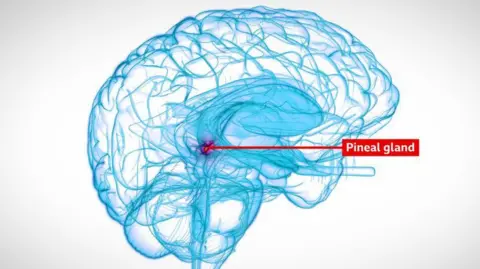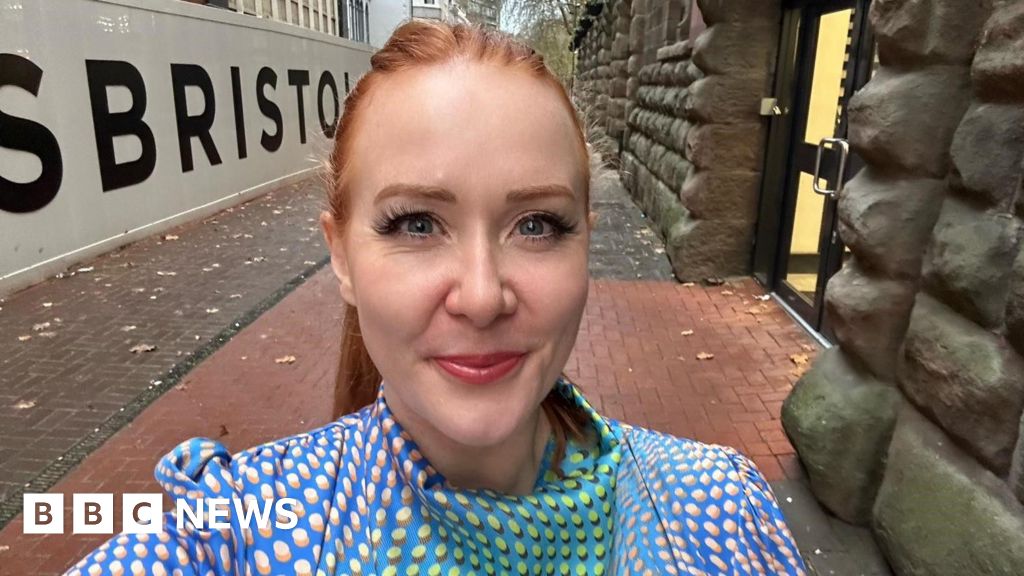 Anna Hill
Anna HillA woman who suffered debilitating migraines for nine years says her symptoms have gone, after paying for “risky” surgery.
Neurologists told Anna Hill, 41, there was no explanation for her condition that once saw her suffering a 94-day migraine. She became so desperate, she crowdfunded for an operation that removed a benign brain cyst.
This treatment is deemed “irresponsible” by most surgeons, but a new NHS clinical trial found nine out 10 patients are “better” after having it.
“I’m working again, I’m exercising, I’m socialising, something I wasn’t able to do before,” Ms Hill said.
‘I was in bed 24/7’
Ms Hill, from Hotwells, Bristol, first developed symptoms as a teenager, which included migraines, bouts of nausea, vertigo, tinnitus and brain fog, meaning she was unable to hold down a job.
“I have spent most of my time in bed just trying to sleep off the pain in my head,” she told the BBC in 2018, just before she travelled to Germany for the operation.
She added the most concerning seizures made her feel like she “lost herself”.
Eventually Ms Hill underwent a brain scan, which revealed a tiny benign growth.

She then joined a pineal cyst support group, mainly consisting of young women, who believe such cysts are to blame for debilitating symptoms.
Ms Hill resorted to raising £36,000 to travel to Germany for treatment by neurosurgeon Prof Henry Schroeder, from Greifswald University Hospital, in 2018.
Back in 2018, Prof Schroeder claimed to have carried out 48 operations with a 94% success rate.
Prof Alistair Jenkins, of the Society of British Neurological surgeons, believes the operations are “irresponsible”.
He said: “There are around 40,000 neurosurgeons in the world, the fact that there are only six who are prepared to do it, I think says more about the procedure than about the ability of those neurosurgeons.”
He warned a pineal cyst should only be removed in extremely rare circumstances, and believes the operations’ successful results could be explained by the “placebo effect”.

After a lengthy recovery, Ms Hill said her life was now back to normal.
“I think at my worst, I had a migraine for 94 days, and nothing would touch that, no painkillers, even the really, really strong ones.
“When you interviewed me before I was in bed pretty much 24/7.”
Now, she is able to work, exercise three times a week and socialise with friends.

Addenbrookes Hospital in Cambridge has just finished a clinical trial on 40 pineal cyst patients to try to answer the question as to whether this operation is causing a real, or placebo improvement.
Led by neurosurgeon Prof Thomas Santarius, the study involved patients being assessed by various specialists, and documenting their symptoms before and up to three years after the operation.
Prof Santarius said: “The study showed that the treatment is effective and safe.
“About 90% of the patients are overall better at one year following surgery, and this benefit seems to persist till the latest follow up, which is on average, three years.”
Former neurosurgeon Prof Richard Nelson, who led the development of the Institute of Clinical Neurosciences in Bristol, said the “placebo effect” rarely accounts for 90% of results.
“It would be stretching things to say you would reach a placebo effect of 90% and I think that suggests that there have to be some mechanisms underlying the improvement, certainly in selected patients,” he said.

Bristol solicitor Kara Williams, 36, underwent the surgery in 2019.
She said: “A couple of days after the operation both my mother and husband said that by looking in my eyes I looked myself again, and that is how I felt.
“I felt this huge pressure had been lifted from my brain.
“I’ve got my life back again and without that surgery I wouldn’t have been able to do any of the things I have done in recent years.”
Prof Santarius has already presented his findings at an international conference and hopes to put them in for publication shortly.
 PA
PACelebrity Davina McCall’s recent revelation that a colloid cyst in her brain was picked up on a routine screening has focused attention on how such scans can detect minor abnormalities.
But Prof Jenkins warned that although it is tempting to attribute any symptoms to them, such as headaches and dizziness, this is not always the case.
Surgery not without risks
He said: “Unfortunately – or perhaps fortunately – medicine doesn’t work that way.
“Some of these abnormalities are quite common, but rarely cause any problems.
“For a link to be made with a scan finding, and for surgery to be proposed, there has to be a plausible mechanism for symptoms to be produced and a reasonable expectation that the symptoms will be resolved by surgery.
“And surgery is, of course, not without risks. For any surgery, the risk of operating has to be less than the risk of not operating.”
Pineal cysts symptoms can be caused if the cyst is big enough to obstruct the passage of cerebrospinal fluid – the fluid constantly produced by the brain, which bathes and supports it, he added.
“In this case, pressure inside the head can rise, causing headache and very occasionally more serious problems.
“By and large surgeons will not offer surgery if this is not the case.
“But in the case of cysts of the pineal gland, there is a large amount of information on the web which prompts patients to seek surgery for minor and often unrelated symptoms.
“Some surgeons are prepared to offer an operation and there the controversy starts, because surgery for these deep-seated cysts is not without significant risks,” he added.
There are no current plans to offer the surgery to NHS patients.




